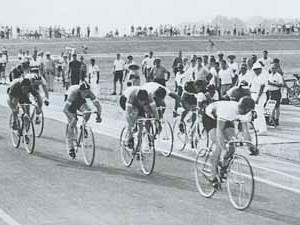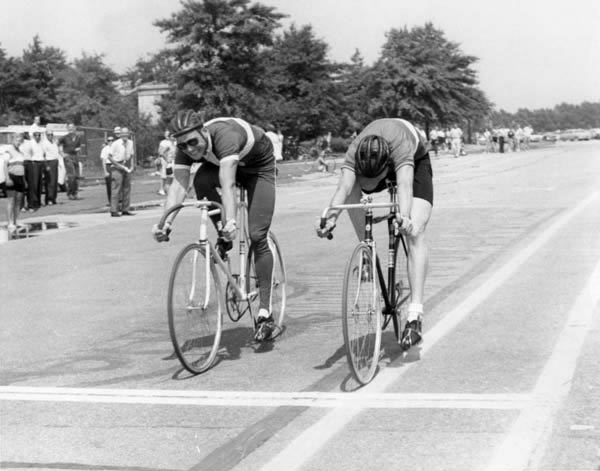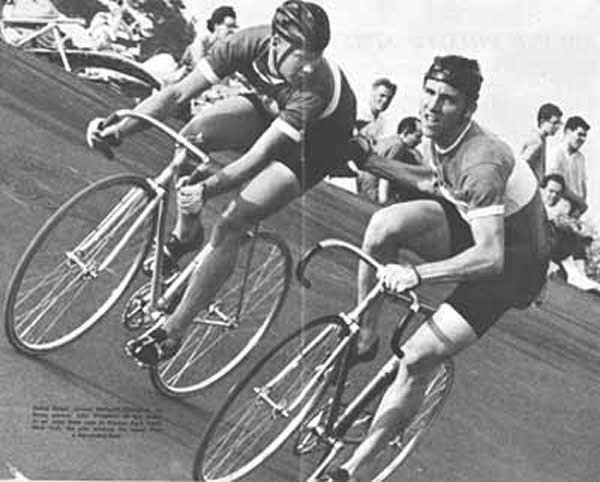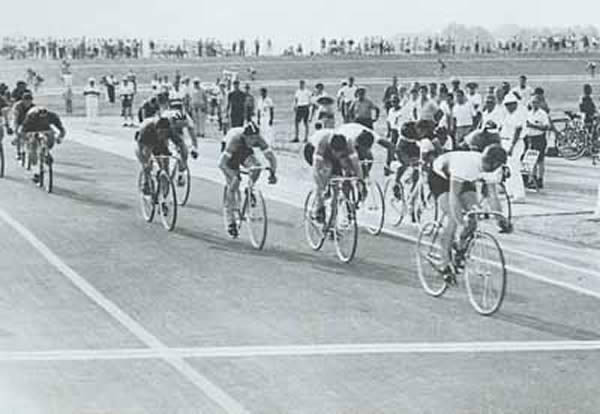
Transcribed and edited by Peter McCormick
On Not Getting Shot in Vietnam and Racing in Europe
schmalz I have to hear about your six-day racing in Europe. How did that work? When did you go over?
Simes Ok, you’re jumping way ahead. A lot happened between 1960 and when I went to ride six-day races in 1969. The whole country changed. Everything was changing.
schmalz And you had to be done with your amateur racing. You couldn’t go to the Olympics.
Simes There was no pro racing in the United States. From the time I was 13, I’d been reading all my father’s cycling magazines. I was following what’d been going on in track racing, and I had decided that I wanted to become a professional. Through the mid-Sixties, Vietnam was heating up. You had the draft. It was mandatory: you got drafted into the service. If you were in school, you got drafted once you got out. I was in and out of school mainly because I wanted to race my bike and I didn’t want to go and fight in Vietnam.
schmalz Seems reasonable.
I was trying to figure out how not to go out and get killed in Vietnam and race my bike at the same time.
Simes It was reasonable, believe me. And then, if I had turned professional, there would have been no opportunity to pursue cycling in the Army. But for an amateur athlete, if you were an Olympic contender, they had programs for public relations purposes. [The Army] had a cycling team and there was an opportunity to get on that. Having been through the Olympics already, I had an opportunity. I was trying to figure out how not to go out and get killed in Vietnam and race my bike at the same time. That prevented me from going to Europe and becoming a professional earlier.
schmalz But you got to ride your bike and not get shot at.
Simes Yeah, I got drafted eventually into the Army and I got to ride my bike and not get shot. While I was in the Army I had got second in the World Championships in the kilometer. That made me believe I could go on to the professional level. I had planned that for a year, when I was in the Army. I saved up all my leave and took it at the end of my service so I could just train. I got out of the Army in December of 1969 and four days later I was over in Europe, to try to break into professional cycling on the track.

Simes and Lynch battle on the track.
The Golden Age of Six-Day Cycling in Europe, or “You’re Like a Gladiator”
schmalz That era was really a kind of golden age because you had all the road riders doing the six days during the winter.
Simes It really was the golden age of six-day racing in Europe. It really was.
schmalz You met [Five-time Tour de France winner Jacques] Anquetil there didn’t you?
Simes Anquetil was doing it. He didn’t ride sixes – he may have ridden a six or two in France, I don’t know. But they had other races on the track for the roadies. They had road man omniums and things like that, where they’d bring a handful of these guys in for each track meeting and they’d ride a series of races. Yeah, I had personal contact with Anquetil, who had been a hero on the road to look up to while I was a kid growing up. It was quite a thrill to be in the same small cabin area where you have Anquetil or Eddy Merckx coming in. There was Sercu and Peter Post, who had won Paris-Roubaix [in 1964] and was king of the sixes; he was around. To be able to mingle with them, that was quite an experience.
schmalz Did you race against Merckx, Jack?
Simes He said we raced against each other, but he was not in any of the sixes that I was in at that time.
schmalz You’ve done a lot of racing when you don’t know whether you’ve raced against Eddy Merckx or not.
Simes Oh yes. It was pages and pages and pages and chapters and chapters and chapters. So many experiences. I’ve been to Europe at least a hundred times. There are so many layers that you have to sort through after a while (Laughs).
I was looked at just as a novelty, because there were no American pros at the time.
schmalz How was the adaptation to European sixes? Did you get in, have success right away? Were they tough on you, as the American?
Simes I was looked at just as a novelty, because there were no American pros at the time. The closest thing had been Pat Murphy of Canada. He was a pioneer in his own right. He had gone over and done six-day races, but that had been some years before – I think that was the late 1950s. A lot of time had gone by. I wound up settling in Antwerp. I got a small apartment there. I knew an Australian who had been an amateur sprinter during my time. I travelled around a bit with him in Denmark. He had become Tom Simpson’s partner in the six-day racing until Simpson died (on the Mt. Ventoux stage of the 1967 TdF) and he had settled in Antwerp, so I wound up going there. Also, Antwerp was a sort of a mecca. You had the old Antwerp Sport Palace and training was available, so every day I’d train on the Antwerp Velodrome.
I got to know an old soigneur who took care of Eddy Merckx and Anquetil. They had what they called the Midweek Race on Wednesday afternoon. They would put the heat on in the place and there’d be extra lights. There would be developmental training races for young pros, young amateurs coming up. There’d also be a mix of professionals who wanted to get a workout there. Occasionally, there’d be something special going on, and there’d be reporters scouting out new young guys. I was riding these midweek Madisons with various partners; just picking up people here and there.
There came a point at one of the races where they needed another derney rider. I was in the cabin with the old soigneur and there was an English rider [Norman Hill] there who was a moto pace rider, so he was not a natural to ride derney. It was a derney race where it was the debut of Rik Van Linden, who became a pretty good rider on the road. This was his first professional race so this was done for publicity. Reporters were there to write about Rik’s debut in the pro ranks. They needed another derney rider.

Racing the Madison at Kissena
The promoter came down to the cabin and said to the English fellow, “Norman, can you get your bike ready?” Norman knew how hard this race was going to be. I had never ridden in the derneys but I wanted to get into six-days and was trying to find a way to do this. The old soigneur realized this could be a path. When Norman said, “my bike’s not ready; I don’t want to do this,” the old soigneur instantly said to me, “Jack, you can ride the derneys, right?”
I looked at him and said, “Uh, yes, that’s right!”(laughter) As soon as I got that out of my bike, he said, “Quick, I’ll make your bike ready.” He got the bike and put the right gear on. I got up on the track within seconds before the race went off.
Boom, off we went. It’s important to have a derney driver who knows what he’s doing. I had a derney driver who was having his first race. He was an old champion cyclist but it was the first time he was driving a derney in a ring. Two rookies getting together. I was halfway through this race and I couldn’t believe how hard it was.
Afterwards, they write in the newspaper, “The American, a revelation.” It wasn’t true; it was just publicity …
We were riding 55 x 14 … In derney racing you have moto pacing and people think, “oh with moto pacing it’s light riding.” It’s heavy stuff, believe me! You’re not getting much draft and it’s hard. I got halfway through this thing and I really wanted to quit, it was that hard. But I thought: “I gotta hang on here all the way to the end.” I know I’ve got some kind of kick because I’m a sprinter. That never leaves you. So, we got into the last laps and I just kicked. I was telling the guy, “allez.” You have only two commands in derney racing and the derney driver does the rest. You say “allez,” which is go and he picks it up a little bit or you say, “ho”. So I wind up up getting second to Rik Van Linden. I was maybe a length behind.
schmalz At least you didn’t spoil his debut, Jack.
Simes I would have if I could have, believe me. It was all a day in the life for him, a routine ride. For me it was really hard. I didn’t realize the importance of the thing. Afterwards, they write in the newspaper, “The American, a revelation.” It wasn’t true; it was just publicity. I’m a scrapper, I’m fighting in these training races for every inch I get.
Well, the organizers liked my ability to sprint and fighting ability. So I replaced a guy in the six-day. That was my opportunity. It was like a roll of the dice. Maybe I would never have gotten in except for that. When I got into the six-day, I went OK. I finished maybe halfway down in the field, which was pretty credible.
schmalz But that’s a whole different world, once you get into the six-days? Because you’re living there, you’re in the cabin, correct?
Simes I didn’t really know everything that was going on. You’re like a gladiator; you go into the arena. You live down in the dungeon, down underneath. They set up a kitchen; they feed you there. When I came in, I saw [Patrick] Sercu (most successful six-day rider in history), who comes in with his own bed. I couldn’t figure out what was going on there until I saw where they had me sleeping: this underground concrete cubicle that had a bunk of concrete molded into the wall with a straw mattress lying on top of it. I went to the old soigneur, who said, “I’ll get you some bedding. I’ll take care of that.”
As a rookie, once you get into it, it’s like a family. You’re pretty much accepted—it’s hard to get there. To be in there, you have to be pretty damn good.
On Being Called a Klootzak: An Encounter with Peter Post, Six-Day Star
schmalz Let’s wrap up with your run-in with Peter Post. Was it a six-day race or a different race?
Simes It had started first when I was in a six-day race, sprinting against him in Holland, because I thought I was going to win a car. He didn’t like what I was doing there, and that carried over. We got to the London six-day, and I was riding with a guy named Graeme Gilmore, who was a top rider. Post was riding with Sercu: they were a famous team.
On the first night we were in what they call the chase, the final Madison. I’m a relative rookie, but I’m starting to learn my way around. It’s going very fast and in the last three minutes of the race, we’re coming into the final time of the sprints and it’s just balls-out.
I look over on the other side of the track and I see Gilmore is in front, making tempo. Fast speed. The whole sprint is behind him. I saw where I had to come in on the track. You look behind you and you have to loop right back to the front, to make sure you don’t run into anybody. So as I start down to get into position where he’s going to sling me, at that moment as I looked away to look at the front, Post made an attack in the final dash. He and Sercu are the best team by far. I’m coming in. Gilmore’s in the peloton in the bottom of the track, and Post is attacking over Gilmore. As I’m coming in, Post should really go around me. But he didn’t. He took the short way through.
schmalz And he gets in the middle of your exchange.
Simes Correct. Gilmore’s on the bottom, Post is right on top of him, and I’m coming in not knowing Post is going through there. You get three guys in the space where two should be. We’re just body-to-body at a very fast speed going through the tight banking in the turn, just against one another. Post has more speed because he’s attacking. He pops through. He picks Sercu up about five meters in front. He slings Sercu in. Gilmore slings me in. As I’m coming around, Post, who’s on the bottom of the track – you’re supposed to drop off to let the other riders go by to the top.

Jack winning a 10-mile race
I was just thinking: “Holy shit: I’ve just knocked off the star of the six-days.”
As I’m coming he turns around and throws his hand up at me and calls me a “Klootzak” – asshole. I’m at speed now. Gilmore just threw me in; this is happening at very fast speed. As [Post] does that, his bike wavers up the track just slightly. Instead of slipping around him, I figure I’ll just brush him. He called me a name. I’m going fast: I brushed him with my shoulder except I hit him pretty hard. He’s a big guy. I don’t know, 6’3”, something like that. It knocked him off his bike. He goes down and Sercu is on the attack and he’s expecting to pick Post up one more time. But Post is lying on the ground. You’ve got a packed stadium. This is the team favorite to win the first Madison.
schmalz How did the crowd react to that, Jack?
Simes I have no idea. I was just thinking: “Holy shit: I’ve just knocked off the star of the six-days.”
schmalz He did have it coming.
Simes Yeah. He did have it coming. It flashed in my mind, what did I just do? Then this Australian guy who’s kind of my mentor, he said, “if you get into trouble, make sure you finish the job.” I thought: “You know what? I’m going to finish the job.”
When I came around the next lap, I didn’t even ride to my rider [Gilmore]. I had no idea how this looked to the promoters or spectators. I’m in the race after I knock Post off. I stop. I glove my bike down. I’m going to finish the job. I got right out of the middle of the race and go to Post’s cabin, where he was. I came right up to him.
I’m in this frenzy that goes on in Madison racing – emotionally, I’m on another level. I’m hot. I say to him, “Who do you think you are? I’m just a beginning rider. You’re the king of the sixes but that doesn’t give you the privilege to do what you did and then try and blame it on me. It’s your own damned fault.”
We were just arguing there. He turned around and people started coming between us. I turned around and started to walk away. He pushed at me from behind and I went right back at him, pushing and swinging into him. He went down into his cabin and people kind of pulled us away.
That was the end of that altercation. I raced with him but I didn’t speak to him for a long time until he came through with the Panasonic team on the Tour de Trump and I was running the Pro Federation here. I saw him at one of the hotels after hours. We talked at the bar and just had a great time. There was never any mention of anything. [London] was just something that happened in the heat of the moment. Things like that happen. It’s a microcosm of life, six-days. Things like that happen and you’re in a very heightened emotional state. Everybody realized that.
Generally, at that level of professional racing, when something happens on the bike, and you get off the bike, 9 times out of 10 it doesn’t stick. It’s like, “Let’s go have a beer.”
You do have stuff that sticks. Look at Contador and Armstrong. That’s got some teeth. That’s not going away. That will go away later, when they’re both off the bike and into other things. Then they’ll have all the respect for each other that they claim not to have for each other right now.
schmalz I think there are people whom Eddy Merckx still holds a grudge against.
Simes Give me an example.
schmalz [Felice] Gimondi. I think he always resented the way Gimondi rode against him.
Simes I don’t know about that. I was at a bike show – they used to have the bike shows in New York – and we were all at dinner, sitting at a round table with Gimondi, Eddy, and there were a bunch of other people there. Eddy was the same. He was incessantly hounding Gimondi. We’re all sitting there, drinking wine, and Eddy would chant, “Felice, Felice, Felice.” And Gimondi was going, “Oh come on, Eddy, please. I couldn’t win against you then. I couldn’t win against you now. Come on, give me a break.” I mean, they were quite friendly.
schmalz So Eddy still liked to poke Gimondi, but it was more of a friendly poke.
Simes Oh yeah. Everyone recognizes Eddy as the best of all time, I think. And Gimondi said, “if it weren’t for Eddy, I really would have been the greatest!”(Laughter). Gimondi was a prodigy.
schmalz Jack, it’s been great. I think we’ve set a new record for length of interview. I think we’ve just got the first chapter. We’ll have to call back and get the stuff on your Olympic career. Thanks a lot.

Great interview, nice to read about racing and racers for a change.
terrific read. thanks for the series.
1st
http://www.cyclingnews.com/news/alberto-contador-tests-positive-for-clenbuterol
Fascinating stuff – awesome job!
…that was definitely fascinating stuff !!!…(hi, mikeweb)…
…it was obvious you & simes were enjoying yourselves & that peter post recounting was “live & right there”…i could picture it…
…i knew “of” the simes cycling legacy as i was gaining my legs in the early ’70’s but this is the first time, all these years later that i’m hearing all these wonderful stories…
…major props, love, bgw…